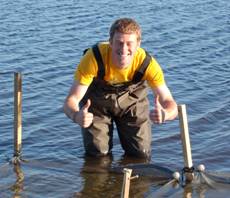Behaviour and Ecology
@ School of Life Sciences,
University of Nottingham
| Home | People | Research | Teaching | Publications | Opportunities | Links |
Job de Roij (PhD, 2010)
 Job completed his PhD, which was supervised by Andrew MacColl, in early 2010, and left to start a postdoc in Helsinki. Read about his PhD interests below.
Job completed his PhD, which was supervised by Andrew MacColl, in early 2010, and left to start a postdoc in Helsinki. Read about his PhD interests below.
Research Interests
Broadly speaking, my research focuses on the potential of parasites to act as a driving force of natural selection and evolutionary change. I am particularly interested in the 'ecological theory of adaptive radiation', which posits that adaptive radiation is ultimately the outcome of divergent natural selection stemming from ecological variation.
Although the role of
interspecific interactions such as predation and competition as
generators of divergence is becoming increasingly well-established, the
impact of parasites on this process has received far less attention.
Using a number of salt- and freshwater populations of three-spined
sticklebacks (Gasterosteus aculeatus) on North Uist (Outer Hebrides), I
hope to examine ways in which parasites influence the divergence of
these populations, focusing specifically on life history traits (e.g.
growth) and immune responses. The Isle of North Uist comprises a vast
network of lochs, the majority of which harbour sticklebacks. These
allopatric populations have diverged considerably in morphology and
exhibit differences in parasite community structures, making it an
ideal study system. The two parasites of key interest are the trematode
Diplostomum gasterostei and the tapeworm Schistocephalus solidus, both
of which are known to have strong fitness consequences (selective
effects) on the stickleback host.
